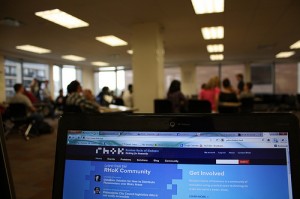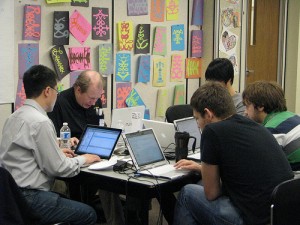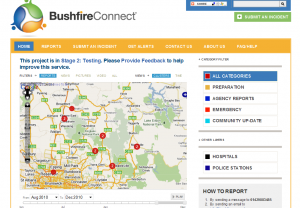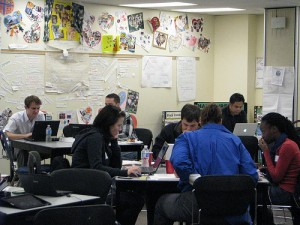Competitors build life-saving apps for disasters and emergencies in global weekend challenge
Teams at Random Hacks of Kindness Toronto “hackathon” create new mobile and online tools
WHAT: Hackathon to solve humanitarian problems & pitch competition
WHEN: Pitch competition & judging: Sun., June 5 from 3 to 5 p.m.
Hackathon: Ends Sun., June 5 at 3 p.m.
WHERE: Ontario Institute for Studies in Education (OISE), 5th floor, 252 Bloor St. W., Toronto
WHO: Experts in climate, disaster, crisis; software, design, Internet, media, more (see below).
TORONTO, June 5, 2011 /CNW/ – Disaster professionals working with volunteer software makers in Toronto yesterday began building a set of mobile and online emergency aid tools whose prototypes they aim to complete today. This evening, competing teams will vie for prizes in a pitch competition judged by a panel of experts.
The teams at Random Hacks of Kindness Toronto (RHoK Toronto) are among some 1,000 people in 18 cities across 6 continents participating in a global weekend-long hacking marathon, or “hackathon,” that unites technologists and humanitarian experts in an effort to solve pressing problems.
“It’s unbelievable that the teams are able to create these mobile apps and online tools in less than 48 hours,” said Heather Leson, lead organizer of RHoK Toronto. “By dinner time last night, one team here had already programmed a working prototype!”
Projects
Competitors at the Ontario Institute for Studies in Education in downtown Toronto are working on six projects:
A mobile app that can use Twitter, Facebook, e-mail and other notification services to deliver emergency messages even when cellular phone networks have stopped working, and can alert rescue workers when someone is alive under a collapsed building
A telemedicine tool that would help people in remote or disaster-stricken areas to visually diagnose life-threatening wounds and help them seek treatment
An alerts tool that harnesses the emergency response capabilities of the worldwide ham radio community to bridge the digital divide with Internet-based first-responders
An app that helps people find and identify food growing in their immediate vicinity
A tool that helps relief workers track and manage emergency medical kit inventory in the field
A tool that enables people to avoid adverse drug reactions and helps them create a personal digital medical history.
The Random Hacks of Kindness volunteer community — founded in 2009 by Google, Microsoft, NASA, Yahoo and the World Bank — has produced mobile and online software tools that were deployed after disasters in Chile, Haiti and Japan.
Pitch competition Sunday afternoon
“This afternoon’s pitch competition will let the teams in Toronto show off their work — and give the most innovative ones bragging rights,” said RHoK Toronto manager Melanie Gorka. “The best pitches will also win prizes that include a private lunch with leaders at Mozilla, which makes the Firefox Web browser; high speed computer networking equipment from Linksys by Cisco, security software from Symantec, and more.”
The Toronto teams will also be able to receive coaching to develop and enhance their pitch and presentation skills, and consult with special guests who are experts in crisis and emergency aid, before they showcase their projects in front of the pitch competition judges:
Jesse Brown, host of TVO.org Search Engine podcast; writer for Macleans.ca, Toronto Life.
Paul Osman, Mozilla Foundation. Open Web team manager.
Karen Snider, Canadian Red Cross national media manager and social media strategist.
Julia Stowell, Microsoft Canada open source community and marketing manager.
Special guests:
Sara Farmer, United Nations Global Pulse chief platform architect.
Kate Chapman, Humanitarian OpenStreetMap Team. Open global map for aid efforts.
Aaron Huslage, SafeCast. Crowdsourced open tracking of reactor-leak radiation in Japan.
“The best part of Random Hacks of Kindness is that no matter which teams win Toronto’s pitch competition, all the participants learn, mentor and share in their world. Plus, some projects will continue and maybe become fully built,” Heather Leson said.
ABOUT RANDOM HACKS OF KINDNESS TORONTO:
RHoK Toronto is an ad hoc committee of civic-minded citizens with professional expertise across a broad range of industry sectors. The first Random Hacks of Kindness hackathon in Toronto was held in December 2010.
Community partners new and old have donated space, food, funds, prizes, services and tools to help make the event a success. Donations may be made through the RHoK.org Toronto site or by contacting the organizers. Current sponsors include: Camaraderie, Centre for Social Innovation, CIRA, Cisco, GlobalNews.ca, Jonah Group, Lady Atelier, Marketcrashers, MaRS Discovery District, Aaron McGowan, Microsoft Canada, Net Change Week, Nitido Inc., Rightsleeve, Symantec, Syncapse, Tropo, Tucows Inc., University of Toronto and Yahoo Canada.
RHoK Toronto is online at: www.rhok.org/event/toronto
RHoK Toronto on Twitter: www.twitter.com/RHoKTO
RHoK Toronto hashtag: #RHoKTO
ABOUT RANDOM HACKS OF KINDNESS:
Random Hacks of Kindness was founded in 2009 by Google, Microsoft, NASA, Yahoo and the World Bank. The worldwide innovation community has seen thousands of volunteers work on 120 open source software projects, including tools used in the Haiti and Chile earthquakes in 2010, the recent Japan quake and tsunami, and landslide-prone parts of the Caribbean. “Open source” means the computer code is available for anyone to use and build upon.
Global Random Hacks of Kindness community: www.rhok.org
On Twitter: www.twitter.com/randomhacks
Twitter hashtag: #RHoK
For further information:
OR TO SCHEDULE INTERVIEWS:
Melanie Gorka or Heather Leson
melanie.gorka AT gmail DOT com heatherleson AT gmail DOT com
Twitter: @melgorka Twitter: http://twitter.com/#!/leftbutton




